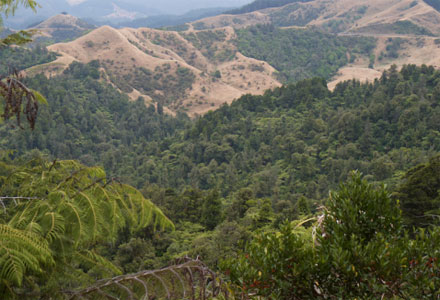
Whanganui iwi have been offered an opportunity to harvest carbon credits off waste or unproductive land if it becomes permanent forest. Source: New Zealand Herald
On September 28 the new Māori Carbon Foundation held a meeting at Cooks Gardens Function Centre to outline its proposal. About 40 people were there to hear it.
On suitable land the foundation is offering to establish, maintain and insure a forest at its own cost. It would pay for this by cashing in the carbon credits (NZUs) for the first seven years.
From year seven until year 30 the forest’s NZUs would be split 50:50 with the Māori owners. After that the foundation’s carbon and forestry rights would be ended and the owners would get all the NZUs.
Each hectare of average forest could earn NZ$10,000-worth of NZUs over 30 years.
Iwi and hapū would continue to own the land and be able to access it. The forest would be permanent, perhaps reverting to native species.
The proposal was outlined by Sir Mark Solomon, who chaired the financially successful Te Rūnanga o Ngāi Tahu until 2016. He said Māori set it up in order to have their voice heard in this new climate change/carbon price/billion trees era.
The foundation was launched on September 17, and is touring 20 New Zealand centres to make its offer to Māori. It got good crowds in Kaitaia, Kaikohe and Wairoa. Whanganui was its seventh stop.
It has backers with “megabucks” to fund the scheme, Solomon. It will get expert advice from a New Zealand owned private business – New Zealand Carbon Farming.
The foundation has six directors, including managing director Jevan Goulter, who was in Whanganui in 2010, involved in a controversial Miss Wanganui competition and standing for mayor. Asked what land would be suitable for the forestry deal, Solomon said in order to be part of the Emissions Trading Scheme (ETS) and get NZUs it must have been unforested in 1990.
The foundation was only interested in blocks of 40ha or more, and land that was otherwise unproductive would be best.
“Some will want to do it on good productive lands. Personally, I’m not a fan of that concept,” he said.
Trees planted could be a mixture of natives and exotic species like pinus radiata. But exotics store carbon faster, and are cheaper to buy and plant.
“The money is in the exotics. If you have too high a mix of natives it becomes uneconomic.”
He advocated planting natives along the waterways, and said the forest would improve water quality.
The NZUs – currently worth NZ$25 each – would be sold to organisations needing to offset the carbon they emit by burning fossil fuels.
The foundation is willing to help iwi create nurseries to grow the trees, and pay them to keep pests down, plant trees and maintain access.
It has appointed Donna Awatere Huata as Māori Climate Commissioner. She’s a former activist and Act MP who was jailed for fraud in 2005, and has since had many other public roles. She said global warming would hurt Māori more than other peoples.
She welcomed moves to lift the NZ$25 price cap on NZUs, because it will force polluters to pay the true price of their polluting.
Dame Tariana Turia is the patron of the foundation’s Māori Carbon Social Trust. She got involved to make the foundation more trusted, and also because the forests could earn money that will help her people.
“I want that investment to go into our whānau and hapū in things that will be really important for them. We don’t want to be forever in poverty. We want a resource that we can determine how it will be used,” she said.
The proposal is “the greatest opportunity we have been given,” she said, and also probably the first scheme from Pākehā who are not looking to get something for themselves. One aspect was worrying her.
“I have worried myself sick about the notion of growing pine trees. If we are looking for an opportunity to take us into the future, we do what we have to do,” she said.
Hone Harawira said the proposal has been examined by banks and policy people, and at Parliament on September 27.
“Not one of them has been able to find a flaw in this scheme.”







